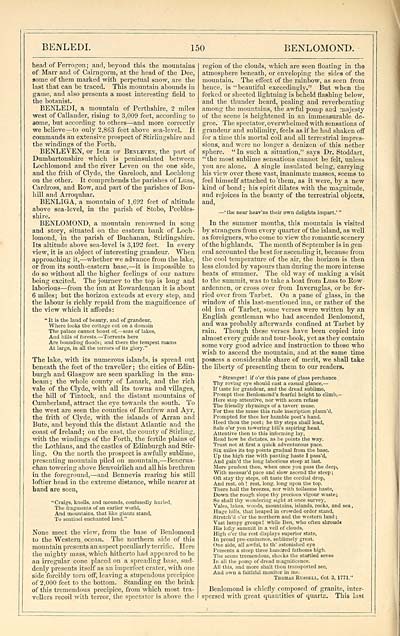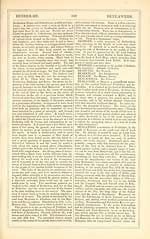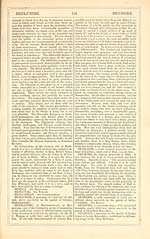Download files
Complete book:
Individual page:
Thumbnail gallery: Grid view | List view

BENLEDI.
150
BENLOMOND.
head of Ferrogon ; and, beyond this the mountains
of Man- and of Cairngorm, at the head of the Dee,
some of them marked with perpetual snow, are the
last that can he traced. This mountain abounds in
game, and also presents a most interesting field to
the botanist.
BENLEDI, a mountain of Perthshire, 2 miles
west of Callander, rising to 3,009 feet, according to
3ome, but according to others — and more correctly
we believe — to only 2,863 feet above sea-level. It
commands an extensive prospect of Stirlingshire and
the windings of the Forth.
BENLE VEN, or Isle of Benleven, the part of
Dumbartonshire which is peninsulated between
Lochlomond and the river Leven on the one side,
and the frith of Clyde, the Gareloch, and Lochlong
on the other. It comprehends the parishes of Luss,
Cardross, and Bow, and part of the parishes of Bon-
hill and Arroquhar.
BENLIGA, a mountain of 1,692 feet of altitude
above sea-level, in the parish of Stobo, Peebles-
shire.
BENLOMOND, a mountain renowned in song
and story, situated on the eastern bank of Loch-
lomond, in the parish of Buchanan, Stirlingshire.
Its altitude above sea-level is 3,192 feet. In every
view, it is an object of interesting grandeur. When
approaching it, — whether we advance from the lake,
or from its south-eastern base, — it is impossible to
do so without all the higher feelings of our nature
being excited. The journey to the top is long and
laborious — from the inn at Bowardennan it is about
6 miles; but the horizon extends at every step, and
the labour is richly repaid from the magnificence of
the view which it affords:
" It is the land of beauty, and of grandeur.
Where looks the cottage out on a domain
The palace cannot boast of, — seas of lakes,
And hills of forests. — Torrents here
Are bounding floods; and there the tempest roams
At large, in all the terrors of its glory,"
The lake, with its numerous islands, is spread out
beneath the feet of the traveller ; the cities of Edin-
burgh and Glasgow are seen sparkling in the sun-
beam; the whole county of Lanark, and the rich
vale of the Clyde, with all its towns and villages,
the hill of Tintock, and the distant mountains of
Cumberland, attract the eye towards the south. To
the west are seen the counties of Benfrew and Ayr,
the frith of Clyde, with the islands of Arran and
Bute, and beyond this the distant Atlantic and the
coast of Ireland ; on the east, the county of Stirling,
with the windings of the Forth, the fertile plains of
the Lothians, and the castles of Edinburgh and Stir-
ling. On the north the prospect is awfully sublime,
presenting mountain piled on mountain, — Bencrua-
chan towering above Benvoirlich and all his brethren
in the foreground, — and Bennevis rearing his still
loftier head in the extreme distance, while nearer at
hand are seen,
"Craigs, knolls, and mounds, confusedly burled,
The fragments of an earlier world,
And mountains, that like giants stand,
To sentinel enchanted land."
None meet the view, from the base of Benlomond
to the Western ocean. The northern side of this
mountain presents an aspect peculiarly terrific. Here
the mighty mass, which hitherto had appeared to be
an irregular cone placed on a spreading base, sud-
denly presents itself as an imperfect crater, with one
side forcibly torn off, leaving a stupendous precipice
of 2,000 feet to the bottom. Standing on the brink
of this tremendous precipice, from which most tra-
vellers recoil with terror, the spectator is above the
region of the clouds, which are seen floating in the
atmosphere beneath, or enveloping the sides of the
mountain. The effect of the rainbow, as seen from
hence, is "beautiful exceedingly." But when the
forked or sheeted lightning is beheld flashing below,
and the thunder heard, pealing and reverberating
among the mountains, the awful pomp and majesty
of the scene is heightened in an immeasurable de-
gree. The spectator, overwhelmed with sensations of
grandeur and sublimity, feels as if he had shaken off
for a time this mortal coil and all terrestrial impres-
sions, and were no longer a denizen of this nether
sphere. " In such a situation," says Dr. Stoddart,
"the most sublime sensations cannot be felt, unless
you are alone. A single insulated being, carrying
his view over these vast, inanimate masses, seems to
feel himself attached to 'them, as it were, by a new
kind of bond ; his spirit dilates with the magnitude,
and rejoices in the beauty of the terrestrial objects,
and,
— ' the near heav'ns their own delights impart.' "
In the summer months, this mountain is visited
by strangers from every quarter of the island, as well
as foreigners, who come to view the romantic scenery
of the highlands. The month of September is in gen
eral accounted the best for ascending it, because from
the cool temperature of the air, the horizon is then
less clouded by vapours than during the more intense
heats of summer. The old way of making a visit
to the summit, was to take a boat from Luss to Bow
ardennen, or cross over from Inveruglas, or be fer-
ried over from Tarbet. On a pane of glass, in the
window of this last-mentioned inn, or rather of the
old inn of Tarbet, some verses were written by an
English gentleman who had ascended Benlomond,
and was probably afterwards confined at Tarbet by
rain. Though these verses have been copied into
almost eveiy guide and tour-book, yet as they contain
some very good advice and instruction to those who
wish to ascend the mountain, and at the same time
possess a considerable share of merit, we shall take
the liberty of presenting them to our readers.
" Stranger ! if o'er this pane of glass perchance
Thy roving eye should cast a casual glance, —
If taste for grandeur, and the dread sublime,
Prompt thee Benlomond's fearful height to climb,—
Here stop attentive, nor with scorn refuse
The friendly rhymings of a tavern muse.
For thee the muse this rude inscription plaun'd,
Prompted for thee her humble poet's hand.
Heed thou the poet; he thy steps shall lead,
Safe o'er yon towering hill's aspiring head.
Attentive then to this informing lay,
Read how be dictates, as he points the way.
Trust not at first a quick adventurous pace.
Six miles its top points gradual from the base.
Up the high rise with panting haste I pass'd,
And gain'd the long laborious steep at last
More prudent thou, when once you pass the deep,
With measur'd pace and slow ascend the steep ;
Oft stay thy steps, oft taste the cordial drop,
And rest, oh ! rest, long, long upon the top.
There hail the breezes, nor with toilsome haste,
Down the rough slope thy precious vigour waste;
So shall thy wondering sight at once survey,
Vales, lakes, woods, mountains, islands, rocks, and sea,
Huge hills, that heaped in crowded order stand,
Stretch'd o'er the northern and the western land :
Vast lumpy groups 1 while Ben, who often shrouds
His lofty summit in a veil of clouds,
High o'er the rest displays superior state,
In proud pre-eminence, sublimely great.
One side, all awful, to th' astonished eye
Presents a steep three hundred fathoms high.
The scene tremendous, shocks the startled sense
In all the pomp of dread magnificence.
All this, and more Shalt thou transported see,
And own a faithful monitor in me.
Thomas Russell, Oct. 3, 1771."
Benlomond is chiefly composed of granite, inter-
spersed with great quantities of quartz. This last
150
BENLOMOND.
head of Ferrogon ; and, beyond this the mountains
of Man- and of Cairngorm, at the head of the Dee,
some of them marked with perpetual snow, are the
last that can he traced. This mountain abounds in
game, and also presents a most interesting field to
the botanist.
BENLEDI, a mountain of Perthshire, 2 miles
west of Callander, rising to 3,009 feet, according to
3ome, but according to others — and more correctly
we believe — to only 2,863 feet above sea-level. It
commands an extensive prospect of Stirlingshire and
the windings of the Forth.
BENLE VEN, or Isle of Benleven, the part of
Dumbartonshire which is peninsulated between
Lochlomond and the river Leven on the one side,
and the frith of Clyde, the Gareloch, and Lochlong
on the other. It comprehends the parishes of Luss,
Cardross, and Bow, and part of the parishes of Bon-
hill and Arroquhar.
BENLIGA, a mountain of 1,692 feet of altitude
above sea-level, in the parish of Stobo, Peebles-
shire.
BENLOMOND, a mountain renowned in song
and story, situated on the eastern bank of Loch-
lomond, in the parish of Buchanan, Stirlingshire.
Its altitude above sea-level is 3,192 feet. In every
view, it is an object of interesting grandeur. When
approaching it, — whether we advance from the lake,
or from its south-eastern base, — it is impossible to
do so without all the higher feelings of our nature
being excited. The journey to the top is long and
laborious — from the inn at Bowardennan it is about
6 miles; but the horizon extends at every step, and
the labour is richly repaid from the magnificence of
the view which it affords:
" It is the land of beauty, and of grandeur.
Where looks the cottage out on a domain
The palace cannot boast of, — seas of lakes,
And hills of forests. — Torrents here
Are bounding floods; and there the tempest roams
At large, in all the terrors of its glory,"
The lake, with its numerous islands, is spread out
beneath the feet of the traveller ; the cities of Edin-
burgh and Glasgow are seen sparkling in the sun-
beam; the whole county of Lanark, and the rich
vale of the Clyde, with all its towns and villages,
the hill of Tintock, and the distant mountains of
Cumberland, attract the eye towards the south. To
the west are seen the counties of Benfrew and Ayr,
the frith of Clyde, with the islands of Arran and
Bute, and beyond this the distant Atlantic and the
coast of Ireland ; on the east, the county of Stirling,
with the windings of the Forth, the fertile plains of
the Lothians, and the castles of Edinburgh and Stir-
ling. On the north the prospect is awfully sublime,
presenting mountain piled on mountain, — Bencrua-
chan towering above Benvoirlich and all his brethren
in the foreground, — and Bennevis rearing his still
loftier head in the extreme distance, while nearer at
hand are seen,
"Craigs, knolls, and mounds, confusedly burled,
The fragments of an earlier world,
And mountains, that like giants stand,
To sentinel enchanted land."
None meet the view, from the base of Benlomond
to the Western ocean. The northern side of this
mountain presents an aspect peculiarly terrific. Here
the mighty mass, which hitherto had appeared to be
an irregular cone placed on a spreading base, sud-
denly presents itself as an imperfect crater, with one
side forcibly torn off, leaving a stupendous precipice
of 2,000 feet to the bottom. Standing on the brink
of this tremendous precipice, from which most tra-
vellers recoil with terror, the spectator is above the
region of the clouds, which are seen floating in the
atmosphere beneath, or enveloping the sides of the
mountain. The effect of the rainbow, as seen from
hence, is "beautiful exceedingly." But when the
forked or sheeted lightning is beheld flashing below,
and the thunder heard, pealing and reverberating
among the mountains, the awful pomp and majesty
of the scene is heightened in an immeasurable de-
gree. The spectator, overwhelmed with sensations of
grandeur and sublimity, feels as if he had shaken off
for a time this mortal coil and all terrestrial impres-
sions, and were no longer a denizen of this nether
sphere. " In such a situation," says Dr. Stoddart,
"the most sublime sensations cannot be felt, unless
you are alone. A single insulated being, carrying
his view over these vast, inanimate masses, seems to
feel himself attached to 'them, as it were, by a new
kind of bond ; his spirit dilates with the magnitude,
and rejoices in the beauty of the terrestrial objects,
and,
— ' the near heav'ns their own delights impart.' "
In the summer months, this mountain is visited
by strangers from every quarter of the island, as well
as foreigners, who come to view the romantic scenery
of the highlands. The month of September is in gen
eral accounted the best for ascending it, because from
the cool temperature of the air, the horizon is then
less clouded by vapours than during the more intense
heats of summer. The old way of making a visit
to the summit, was to take a boat from Luss to Bow
ardennen, or cross over from Inveruglas, or be fer-
ried over from Tarbet. On a pane of glass, in the
window of this last-mentioned inn, or rather of the
old inn of Tarbet, some verses were written by an
English gentleman who had ascended Benlomond,
and was probably afterwards confined at Tarbet by
rain. Though these verses have been copied into
almost eveiy guide and tour-book, yet as they contain
some very good advice and instruction to those who
wish to ascend the mountain, and at the same time
possess a considerable share of merit, we shall take
the liberty of presenting them to our readers.
" Stranger ! if o'er this pane of glass perchance
Thy roving eye should cast a casual glance, —
If taste for grandeur, and the dread sublime,
Prompt thee Benlomond's fearful height to climb,—
Here stop attentive, nor with scorn refuse
The friendly rhymings of a tavern muse.
For thee the muse this rude inscription plaun'd,
Prompted for thee her humble poet's hand.
Heed thou the poet; he thy steps shall lead,
Safe o'er yon towering hill's aspiring head.
Attentive then to this informing lay,
Read how be dictates, as he points the way.
Trust not at first a quick adventurous pace.
Six miles its top points gradual from the base.
Up the high rise with panting haste I pass'd,
And gain'd the long laborious steep at last
More prudent thou, when once you pass the deep,
With measur'd pace and slow ascend the steep ;
Oft stay thy steps, oft taste the cordial drop,
And rest, oh ! rest, long, long upon the top.
There hail the breezes, nor with toilsome haste,
Down the rough slope thy precious vigour waste;
So shall thy wondering sight at once survey,
Vales, lakes, woods, mountains, islands, rocks, and sea,
Huge hills, that heaped in crowded order stand,
Stretch'd o'er the northern and the western land :
Vast lumpy groups 1 while Ben, who often shrouds
His lofty summit in a veil of clouds,
High o'er the rest displays superior state,
In proud pre-eminence, sublimely great.
One side, all awful, to th' astonished eye
Presents a steep three hundred fathoms high.
The scene tremendous, shocks the startled sense
In all the pomp of dread magnificence.
All this, and more Shalt thou transported see,
And own a faithful monitor in me.
Thomas Russell, Oct. 3, 1771."
Benlomond is chiefly composed of granite, inter-
spersed with great quantities of quartz. This last
Set display mode to: Large image | Transcription
Images and transcriptions on this page, including medium image downloads, may be used under the Creative Commons Attribution 4.0 International Licence unless otherwise stated. ![]()
| Gazetteers of Scotland, 1803-1901 > Imperial gazeteer of Scotland, or, Dictionary of Scottish topography > Volume 1 > (246) Page 150 |
|---|
| Permanent URL | https://digital.nls.uk/97462082 |
|---|
| Description | Volume I: Aan-Gordon. |
|---|---|
| Attribution and copyright: |
|

